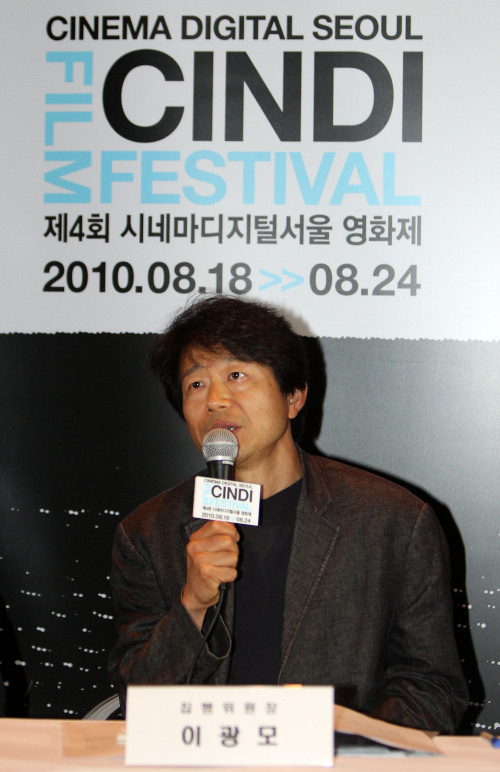Next month’s fourth Cinema Digital Seoul Film Festival ― Korea’s main confab for digital independent filmmaking ― will open with the screening of the recent Palme d’Or winner and the much critically polarized meditative fantasy “Uncle Boonmee Who Can Recall His Past Lives” from director Apichatpong Weerasethakul.
The Thai auteur will also serve as a jury member and engage with local audiences for a master class at the weeklong festival to be held at the CGV Apgujeong multiplex in southern Seoul from Aug. 18-24.
This year’s focus will be how local filmmakers and the industry should embrace the ascent of digital technology and filmmaking in addition to how it can replace traditional celluloid film, Lee Kwang-mo, the festival director, said at a press conference Tuesday in Seoul.
Since its inception in 2006, one of the main goals of the competition has been to bring new, visionary directors to emerge from relative obscurity.
To follow through with that mission to dig up undiscovered talent, organizers have created the “Butterfly Project” for this year’s iteration ― a special category that invites 15 directors and their entries from all over Asia to compete for a chance to negotiate a deal with CJ Entertainment which will finance and distribute their feature debut.
The Thai auteur will also serve as a jury member and engage with local audiences for a master class at the weeklong festival to be held at the CGV Apgujeong multiplex in southern Seoul from Aug. 18-24.
This year’s focus will be how local filmmakers and the industry should embrace the ascent of digital technology and filmmaking in addition to how it can replace traditional celluloid film, Lee Kwang-mo, the festival director, said at a press conference Tuesday in Seoul.
Since its inception in 2006, one of the main goals of the competition has been to bring new, visionary directors to emerge from relative obscurity.
To follow through with that mission to dig up undiscovered talent, organizers have created the “Butterfly Project” for this year’s iteration ― a special category that invites 15 directors and their entries from all over Asia to compete for a chance to negotiate a deal with CJ Entertainment which will finance and distribute their feature debut.

Only three will be chosen among the entrants.
This is similar to the Sundance Institute’s support of emerging filmmakers through their directors and screenwriter’s lab.
Another focus of the festival will be 3-D filmmaking.
Festival director Lee said “A lot of people have fantasies or unrealistic predictions as well as expectations of 3-D filmmaking (in Korea), so we would like to explore the realities, limitations, and the future of that technology through dialogue among filmmakers.
“We’ll explore the possibilities of that technology without over-promoting it or making unrealistic claims of what it can do for the local film industry,” he added.
The selection of Weerasethakul’s Palme d’Or winning film is the festival’s most prominent in its relatively short history.
“For many film buffs, we all know the names Andrei Tarkovsky and Abbas Kiarostami, whose names have been difficult to pronounce and whose films were just as equally difficult to digest,” Lee joked.
“The name Apichapong Weerasechakun, too, should be added to that list. As this year’s Palm d’Or winner, we have selected his film to open our film festival, but not because of his honor at the Cannes Film Festival, but because we believe he is one of the few directors who sincerely understands the language and explores the medium of film to inspire. That is why we invited him.”
He also stated the Thai auteur’s selection as jury member was not due to his win at Cannes.
“His selection as jury member was chosen before his win at Cannes,” Lee said.
During the festival, seven of Weerasechakun’s previous digital shorts will be screened.
By Song Woong-ki (kws@heraldcorp.com)



![[AtoZ into Korean mind] Humor in Korea: Navigating the line between what's funny and not](http://res.heraldm.com/phpwas/restmb_idxmake.php?idx=644&simg=/content/image/2024/04/22/20240422050642_0.jpg&u=)

![[Exclusive] Korean military set to ban iPhones over 'security' concerns](http://res.heraldm.com/phpwas/restmb_idxmake.php?idx=644&simg=/content/image/2024/04/23/20240423050599_0.jpg&u=20240423183955)

![[Herald Interview] Why Toss invited hackers to penetrate its system](http://res.heraldm.com/phpwas/restmb_idxmake.php?idx=644&simg=/content/image/2024/04/22/20240422050569_0.jpg&u=20240422150649)
![[Graphic News] 77% of young Koreans still financially dependent](http://res.heraldm.com/phpwas/restmb_idxmake.php?idx=644&simg=/content/image/2024/04/22/20240422050762_0.gif&u=)






![[Exclusive] Korean military to ban iPhones over security issues](http://res.heraldm.com/phpwas/restmb_idxmake.php?idx=652&simg=/content/image/2024/04/23/20240423050599_0.jpg&u=20240423183955)



![[Today’s K-pop] Ateez confirms US tour details](http://res.heraldm.com/phpwas/restmb_idxmake.php?idx=642&simg=/content/image/2024/04/23/20240423050700_0.jpg&u=)